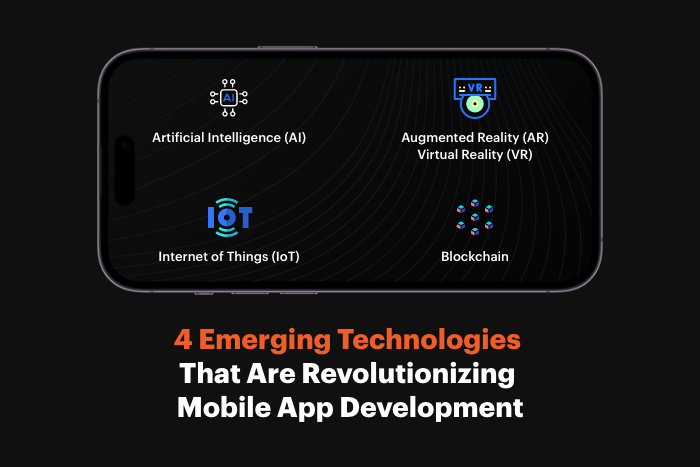Contact Us
If you have made it this far, you are here with a reason. You need our help! We are super friendly and genuinely care to help you succeed.
Enquire today to receive a FREE consultation with an App Guru.
Get in Touch
info [at] appgurus.com.au
Emerging technologies have had a significant impact on mobile app development. These technologies have opened up new possibilities and opportunities for developers to create innovative and robust mobile applications. Here are some examples of how emerging technologies have affected mobile app development.
Artificial Intelligence (AI)
Artificial Intelligence (AI) has revolutionized how mobile apps are developed and used. With the ability to analyze large amounts of data and learn from user behavior, AI has enabled mobile apps to become more intelligent, personalized, and efficient.
One of the key benefits of AI in mobile app development is the ability to provide a more personalized user experience. AI-powered mobile apps can analyze user behavior and preferences to offer customized recommendations and suggestions, improving the overall user experience. AI can also automate tasks and processes, improving efficiency and productivity.
AI has also enabled mobile apps to understand and respond to natural language inputs, making them more conversational and easier to use. This has led to the rise of AI-powered virtual assistants, which can help users with various tasks, from scheduling appointments to ordering food.
As AI technology continues to evolve, it is expected to have an even more significant impact on mobile app development, enabling developers to create more innovative and robust applications that meet users' needs in various industries.
Augmented Reality (AR) and Virtual Reality (VR)
Augmented Reality (AR) and Virtual Reality (VR) are emerging technologies that have significantly impacted mobile app development. AR and VR enable mobile apps to create immersive and interactive experiences for users, making it possible to enhance the way users interact with the world around them.
AR and VR have opened up new opportunities for mobile app developers to create innovative applications in various industries, such as gaming, education, and retail. For example, AR can provide users with a more engaging and interactive shopping experience, allowing them to try on clothes virtually or visualize how furniture would look in their homes. In addition, VR can be used to create immersive educational experiences, such as virtual field trips or simulations.
AR and VR in mobile app development have also enabled developers to create more sophisticated applications that can analyze and respond to user behavior, providing personalized recommendations and suggestions. As AR and VR technology continue to evolve, it is expected to have an even more significant impact on mobile app development, enabling developers to create even more immersive and interactive applications that meet users' needs in various industries.
Internet of Things (IoT)
The Internet of Things (IoT) is an emerging technology that impacts app development. IoT devices are connected to the internet and can communicate with each other, enabling mobile apps to interact with and control these devices.
IoT technology has opened up new opportunities for mobile app developers to create innovative applications in various industries, such as healthcare, home automation, and transportation. For example, IoT-powered mobile apps can monitor and control smart home devices, track and manage health data, and provide real-time updates on transportation schedules and routes.
IoT technology has also enabled mobile apps to analyze and respond to data collected from IoT devices, providing personalized recommendations and suggestions. For example, a fitness app could use data from an IoT-powered wearable device to provide customized workout plans based on the user's activity level and fitness goals.
As IoT technology continues to evolve, it is expected to have an even more significant impact on mobile app development, enabling developers to create even more innovative and robust applications that meet users' needs in various industries.
However, IoT technology also raises concerns about privacy and security, which must be carefully managed to prevent data breaches and other security issues.
Blockchain
Blockchain is an emerging technology that has the potential to revolutionize the way mobile apps are developed and used. Blockchain is a decentralized and secure ledger system that allows for safe and transparent data and information sharing.
Blockchain technology has opened up new opportunities for mobile app developers to create innovative applications in various industries, such as finance, healthcare, and supply chain management. For example, blockchain-powered mobile apps can create secure and transparent payment systems, securely store and share medical records, and track and manage supply chain operations more efficiently.
Blockchain technology has also enabled mobile apps to provide more secure and transparent data management solutions. For example, mobile apps can use blockchain technology to secure and encrypt data, making it virtually impossible for hackers to steal or tamper.
As blockchain technology continues to evolve, it is expected to have an even more significant impact on mobile app development, enabling developers to create even more innovative and robust applications that meet users' needs in various industries. However, blockchain technology also raises concerns about scalability and interoperability, which must be addressed to ensure the widespread adoption of this technology in mobile app development.
Pros and Cons of using emerging technology in mobile app development
Pros:
Enhanced functionality: Emerging technologies have allowed developers to create mobile apps with advanced features and capabilities, providing users with a richer and more interactive experience.
Increased efficiency: With the help of emerging technologies, mobile apps can automate processes and perform complex tasks more efficiently, saving time and improving productivity.
Improved user experience: Emerging technologies have enabled mobile apps to become more intuitive, personalized, and engaging, improving the overall user experience.
New business opportunities: Emerging technologies have opened up opportunities for mobile app developers to create innovative and profitable applications that cater to users' needs in various industries.
Cons:
Complexity: As mobile apps become more advanced and feature-rich, they also become more complex to develop, leading to longer development times and higher costs.
Compatibility issues: Emerging technologies may only be compatible with some mobile devices and operating systems, which can limit the reach of the mobile app.
Security concerns: Using emerging technologies, such as IoT and blockchain, can create new security risks for mobile apps, which must be carefully managed to prevent data breaches and other security issues.
Lack of standardization: Emerging technologies are often still in the experimental phase. There may need to be clear standards or best practices for their implementation in mobile app development, making it challenging to create consistent and reliable applications.
In summary, while emerging technologies have many benefits for mobile app development, they also present challenges and risks that must be carefully managed. However, by staying up-to-date with the latest trends and best practices, mobile app developers can leverage emerging technologies to create innovative and robust applications that meet users' needs in various industries.


